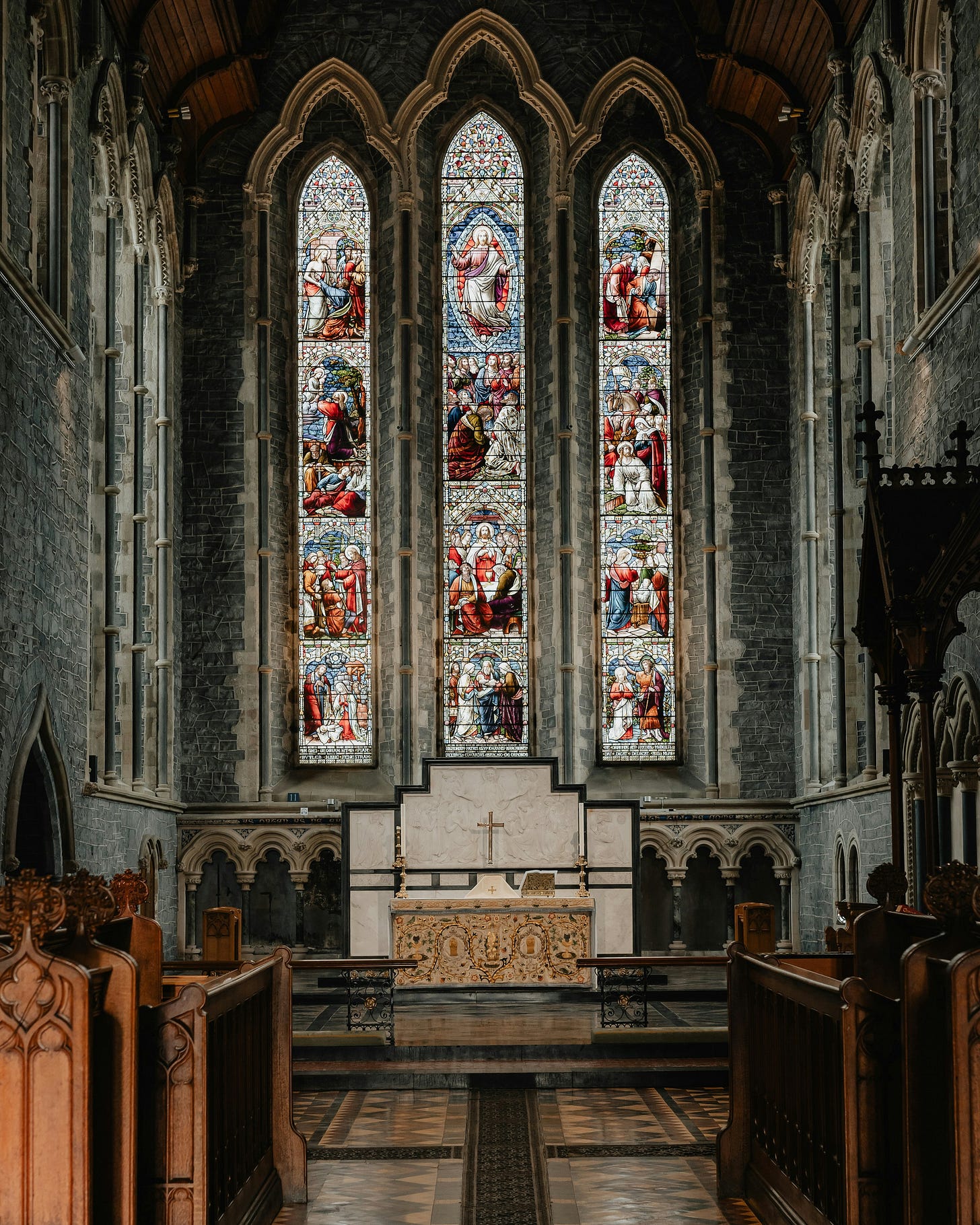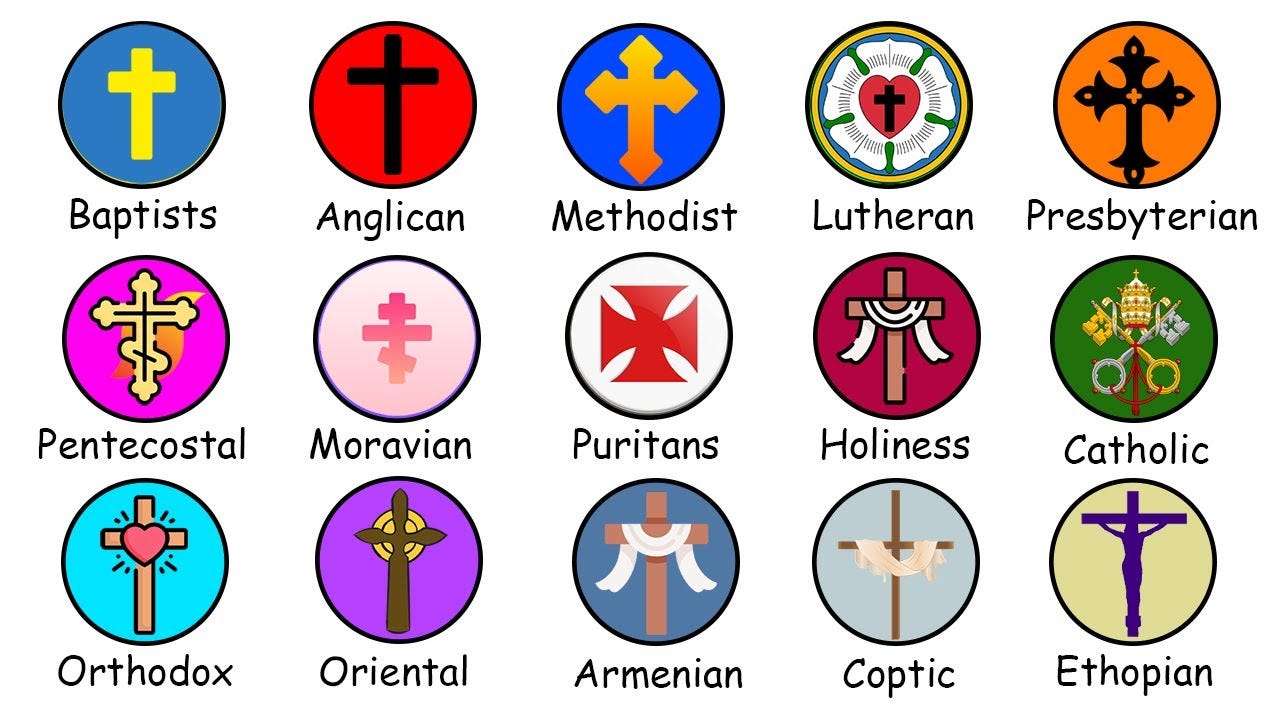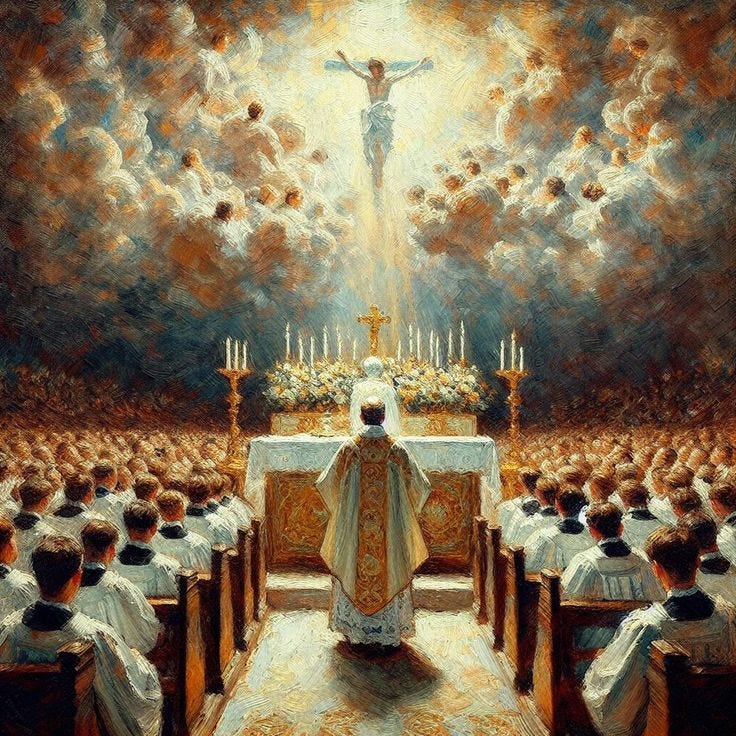Pastor Mark Driscoll Thinks Catholic Priests Are Unqualified Broke Virgins...
Understanding & Responding to Pastor Mark Driscoll’s Misconceptions About Catholicism
Recently the bold Pastor Mark Driscoll made several claims on the Catholic Church. As a former Protestant, I understand why Pastor Mark Driscoll has made these claims…
Pastor Driscoll responds to this controversy with a video and doubles down on his misconceptions about the Catholic Church:
Now, as a Catholic, I encourage all Catholics to engage with these claims openly. Doing so will help us build a better defense of our faith.
Let’s dive in.
Pastor Driscoll’s 8 Main Points:
In his video, Pastor Driscoll made the following claims:
“Tradition muddled the ability to clearly see Christ.”
“I was a Catholic but not a Christian.”
“The Catholic Church added to the canon of Scripture.”
“It would be better if priests were allowed to marry.”
“There were ungodly popes.”
“How can they [priests] counsel on marriage and family without personal experience?”
“Abuse in the Catholic Church could be linked to celibacy.”
“Jesus was unique and isn’t the model for the priesthood.”
Let’s address these one by one.
Claim #1: “Tradition muddled the ability to clearly see Christ.”
This claim suggests a conflict between tradition and the Bible, but Catholic tradition complements Scripture rather than opposing it.
The Sacred Scriptures are the written record of God’s Word (recorded by the apostles).
The Sacred Traditions are the oral transmission of God’s Word (handed down by the apostles).
Both are forms of tradition, and both point to Jesus.
Key points to remember:
Tradition existed before the New Testament was written. The apostles preached and celebrated the sacraments long before the Gospels were compiled.
Any lack of emphasis on Jesus in practice reflects poor catechesis (the process of teaching the faith), not the Church’s teachings.
For example, if a student doesn’t understand math, is it the subject’s fault or the teacher’s? The problem lies with the teacher, not math itself.
“Sacred Tradition and Sacred Scripture make up a single sacred deposit of the Word of God” (CCC 97).
“The Church, in her doctrine, life, and worship, perpetuates and transmits to every generation all that she herself is” (CCC 78).
Claim #2: “I was a Catholic but not a Christian.”
Pastor Driscoll likely meant that he wore the label “Catholic” without understanding or living the faith.
However, for those who distinguish between Catholics and Christians, let’s clarify what being a “Christian” actually means.
Protestant challenges in defining “Christianity”
Some Protestants struggle with a unified definition because beliefs vary widely among denominations. For example:
Some believe in once saved, always saved, while others do not.
Some accept infant baptism, while others require believer’s baptism.
There’s debate over repentance, confession, and the Lord’s Supper.
Each Protestant denomination defines Christianity differently, leading to contradictions.
Protestant denominations with structure:
Lutheranism (founded by Martin Luther)
Reformed (rooted in John Calvin and Ulrich Zwingli)
Presbyterianism (rooted in John Calvin)
Anglicanism (founded by King Henry VIII of England)
Methodism (founded by John Wesley)
While these denominations share similarities with Catholicism (e.g., sacraments, creeds, and liturgical practices), they lack the comprehensive teaching authority that Catholicism offers.
Claim #3: “The Catholic Church added to the canon of Scripture.”
Pastor Driscoll claims that the Catholic Church added to Scripture, citing Proverbs 30:5-6:
“Do not add to His Word, or He will rebuke you and prove you a liar.”
This claim is flawed for several reasons:
1. Understanding the Canon of Scripture:
To claim books were added, we must know:
Which books are considered inspired.
When the canon was officially closed.
The canon wasn’t divinely handed down in a single moment. It was discerned through centuries of debate and study.
The Canon of Scripture was defined at the Councils of Hippo (393 AD) and Carthage (397 AD).
These councils included the deuterocanonical books, which remained part of the Bible until the Protestant Reformation (1517 AD).
The Septuagint, a Greek translation of the Old Testament, was widely used by early Christians, including Jesus and the apostles.
If these Scriptures were good enough for Jesus, why aren’t they good enough for Protestants?
Even Protestant scholars acknowledge the Church’s role in discerning the canon. The website Got Questions states:
“The sixty-six books of the Bible were ‘discovered and agreed upon’ by godly church leaders who had devoted themselves to much study and prayer.”
Ironically, Protestants acknowledge these “godly church leaders” without naming them—the Early Church Fathers.
The Catholic Church is guided by the “three legs of the Church”:
Sacred Scripture
(The Written Word of God)Sacred Tradition
(The Oral Transmission of Faith)Magisterium
(The Authority of the Church to Interpret Sacred Scripture and Tradition)
Today, we can also rely on the Creeds and the Catechism to unite us:
The Apostles’ and Nicene Creeds—statements of faith shared by Catholics worldwide.
The Catechism of the Catholic Church (CCC)—a thorough guide articulating Catholic beliefs.
The Bible doesn’t explicitly list itself as the sole authority. In fact, it acknowledges the importance of oral traditions (2 Thessalonians 2:15).
Without an authoritative teaching body like the Church, many Protestants must rely on personal or pastoral interpretation, which can lead to inconsistencies.
Claim #4: “It would be better if priests were allowed to marry.”
"Wouldn’t it be better if priests were allowed to marry? Wouldn’t it be better if they were allowed to be husbands and fathers and do what the Bible says is good? The Bible says it’s not good for a man to be alone. The Catholic Church is struggling with a decline in men entering the priesthood. Allowing priests to marry might attract healthier candidates and address this leadership shortage. If you only allow men without wives and children into the priesthood, are you getting the healthiest men? Could the celibacy requirement contribute to some of the abuse scandals in the Church?"
This was one of Pastor Driscoll’s weakest points in his video.
He makes several heavy claims here:
The Bible says it is good to be a husband and father.
The Bible says it isn’t good for man to be alone.
There is a shortage of priests, so they should be allowed to have families.
Marriage makes priests healthier and reduces abuse scandals.
These are significant claims made in just a few minutes, and they lack supporting evidence.
I understand this is his opinion, but it’s always easier to make bold statements than to back them up with facts.
Let’s address these points one by one.
The Church recognizes three primary vocations:
Married life
Single life
Religious life
All three are good and holy because all three can lead to a life of holiness.
The Bible makes it clear that celibacy is a good and desirable path for those called to it:
Jesus Himself was celibate.
(Matthew 19:12)St. Paul praised celibacy for undivided devotion to the Lord.
(1 Corinthians 7:7-8)The prophet Jeremiah lived a celibate life.
(Jeremiah 16:2)John the Baptist was celibate.
(Luke 1:15)Mary, the Mother of Jesus, was celibate.
(Luke 1:34)Jesus spoke of “eunuchs for the Kingdom,” referring to those who choose celibacy for God’s work.
(Matthew 19:12)In Revelation, a special group of celibate individuals is dedicated entirely to God.
(Revelation 14:3-4)
Celibacy is not a rejection of marriage but a reflection of Christ’s undivided devotion to God.
It’s true that there’s a shortage of priests in some areas, but allowing priests to marry isn’t the solution.
Celibacy allows priests to:
Focus entirely on ministry without being divided between the responsibilities of a family and the Church.
Live a life that mirrors Christ’s, who was celibate and devoted fully to His mission.
Pastor Driscoll suggests that celibacy could contribute to abuse scandals. However, this claim is not supported by research.
The John Jay College Study (2011) found:
“The unchanging requirement of celibacy for Catholic priests in the United States is not a cause of the crisis.”
Instead, the study concluded that the abuse cases in the 1960s and 1970s were influenced by societal factors and inadequate seminary training.
Scholar Philip Jenkins, an expert on religious studies, states:
“There is no evidence that Catholic or other celibate clergy are more likely to be involved in misconduct or abuse than clergy of any other denomination—or, indeed, than non-clergy.”
The root of abuse scandals lies in individual misconduct, not celibacy.
Celibacy is a sign of undivided love for God. It allows priests to give their lives fully to their mission, free from the responsibilities of family life.
Marriage is a beautiful vocation, but it’s not the only path to holiness. Celibacy, modeled by Jesus Himself, is a powerful witness to the Kingdom of God.
Claim #5: “There have been popes in history who were ungodly men and not canonized as saints because they were so evil.”
Throughout history, there have been 267 popes in the apostolic line of succession leading back to Peter. While it’s true that a handful of them were bad, this raises an important question:
Do bad popes disqualify apostolic succession?
Let’s break it down:
Jesus established His Church and promised, “The gates of hell shall not prevail against it.” (Matthew 16:18)
God works through sinful individuals to accomplish His purposes:
King David committed adultery and murder.
Peter denied Jesus three times.
Noah became drunk.
Samson fell into lust and disobedience.
King Saul struggled with pride and jealousy.
Jacob was deceitful.
Paul persecuted Christians and approved Stephen’s martyrdom.
The pope is personally fallible and capable of sin, except when teaching ex cathedra (protected by the Holy Spirit from teaching error).
Even during the tenure of bad popes, the Church’s core teachings remained intact, proving that the Church’s stability does not rely on the personal holiness of its leaders. For example:
Pope Alexander VI lived a scandalous life but did not corrupt the deposit of faith.
This demonstrates that the Church’s divine foundation ensures its teachings remain true, regardless of the failings of some leaders.
“And I tell you, you are Peter, and on this rock I will build my Church, and the gates of Hades shall not prevail against it.” (Matthew 16:18)
Claim #6: “How can they [priests] counsel on marriage and family without personal experience?”
This claim questions whether personal experience is more important than proper training.
While priests devote their lives to serving the Church, their lack of marriage doesn’t disqualify them from providing guidance.
Consider this analogy:
Counselors or psychologists don’t need to experience every problem they counsel on—such as addiction, trauma, or adultery. Instead, they rely on their training, expertise, and empathy to help others effectively.
Priests, in a similar way, can guide married couples in ways that even a married man might not:
Total availability for ministry:
Priests are not divided between family responsibilities and the Church, allowing them to focus entirely on their parishioners.
Impartial and spiritual perspective:
Priests offer guidance rooted in Church teaching, Scripture, and pastoral wisdom without being influenced by the challenges of their own marriage or family.
If personal experience were a prerequisite for good counsel, then by that logic, Jesus Himself would be disqualified. Clearly, that’s not the case.
Claim #7: “The abuse scandals in the Catholic Church could be linked to celibacy requirements.”
Pastor Driscoll suggests that celibacy might contribute to abuse scandals. Let’s evaluate this claim:
What does research say?
Do non-celibate denominations have better results?
The John Jay College Study (2011) titled "The Causes and Context of Sexual Abuse of Minors by Catholic Priests in the United States, 1950-2010" addressed this issue directly.
It concluded:
“The unchanging requirement of celibacy for Catholic priests in the United States is not a cause of the crisis.”
Instead, the study found that societal factors and insufficient seminary training in the 1960s and 1970s contributed to the abuse cases.
Additionally, sexual abuse is not unique to the Catholic Church or celibate clergy. Research shows that abuse occurs across all denominations and professions.
Philip Jenkins, a scholar of religious studies, explains:
“There is no evidence that Catholic or other celibate clergy are more likely to be involved in misconduct or abuse than clergy of any other denomination—or indeed, than non-clergy.”
In short, the problem lies in the hearts of individuals, not the discipline of celibacy.
Claim #8: “Jesus’ singleness was unique to His mission and not a model for the priesthood.”
Pastor Driscoll argues that Jesus’ singleness was unique and not intended to serve as a model for priests. This claim rests on personal interpretation and sola scriptura (Scripture alone).
Here are three points Pastor Driscoll overlooked:
Jesus is the ultimate example for all Christians:
“I have given you an example, that you also should do as I have done to you.” (John 13:15)
Priests act in persona Christi (in the person of Christ):
Priests embody Christ in their ministry, making His singleness a model for their lives.
Celibacy reflects the ultimate reality of heaven:
“In heaven, all will be celibate, pointing to the fullness of life in God’s presence.” (Matthew 22:30)
Jesus’ singleness isn’t just a unique aspect of His mission—it’s a powerful model for the priesthood and for all Christians called to celibacy. Not everyone is called to marriage, and this doesn’t make their calling any less valuable.
Final Thoughts
As a former Protestant, I admire Protestants’ boldness and evangelism.
However, it will always be easier to accuse than to fully understand. I have seen an increase of Pastors using their Sunday services to mock and uncharitably speak against the Catholic Church…
Here’s what Father David Michael Moses said in response to this:
As Catholics, we recognize that challenges to our faith, like those posed by Pastor Driscoll, can serve as opportunities for deeper understanding.
Let us respond with truth, charity, and humility, always striving to learn and defend the beauty of the faith that Christ Himself established.









This post was very straight-forward and offered great counterpoints. I am often wondering why Protestant Pastors feel the need to make extreme claims such as these, when many of them don't have anything solid to stand on. I felt like you did a really good job of charitably showing the flaws in the arguments presented.
In case you are interested in reading, I've written a post on the Papacy where I touch on the "bad Popes" idea: https://open.substack.com/pub/thegentlenudge/p/theres-something-fishy-about-the?utm_source=share&utm_medium=android&r=2k266z
Who is this guy and why does what he says matter? Why does what any Protestant says about the Church matter? Nothing we say will change their heretical beliefs. Given that most people who identify as Catholic are ignorant of their religion let’s focus on them. Yeah, I know this isn’t what the “popular kids” say but a lot of the people in our pews on Sunday are heading down the road to Hell because no one is teaching them the Truth.